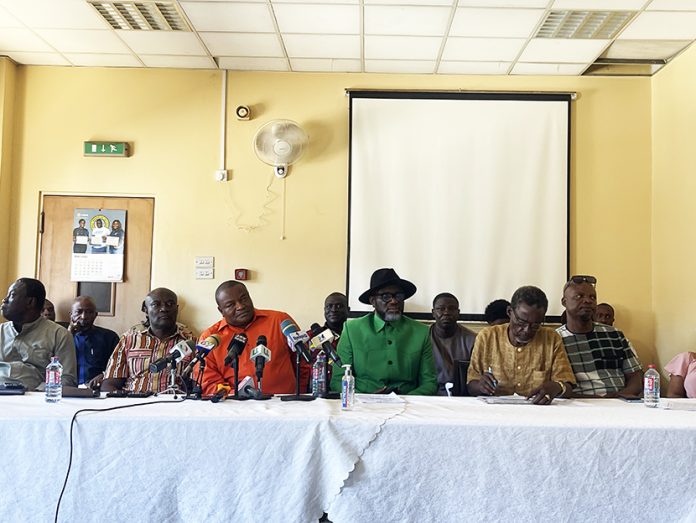Dr. Hassan Ayariga, Leader and Flagbearer of the All People’s Congress (APC), has presented his policies and vision ahead of the 2024 general elections to the Ghana Union of Traders Association (GUTA).
During a meeting held on Tuesday, October 22, 2024 at GUTA head office, in Accra, Dr. Ayariga emphasised that his party, the APC, focuses on actionable policies rather than empty promises, asserting that Ghanaians are tired of broken promises from political parties over the years.
In his opening remarks, Dr Ayariga stressed the importance of changing the mindset of Ghanaians to improve the country’s development.
“We need to change our mindset towards work and our country. Leadership must be transparent, sincere and honest in dealing with Ghana and the citizens,” he stated.
Dr. Ayariga believes that the country’s current attitude toward development, where citizens wait for others to build the nation, is counterproductive. He encouraged collective responsibility and urged citizens to take an active role in the country’s progress.
A key part of Dr Ayariga’s presentation focused on prioritising Ghanaians in trade and industry.
He expressed concern that foreigners have taken control of key sectors of the economy, including the oil and mining industries, while Ghanaians are sidelined.
Another major policy discussed was the implementation of a national data system to streamline governance and development.
According to Dr. Ayariga, a data-driven economy will ensure every Ghanaian is accounted for, from their properties and businesses to their family details.
This system, he explained, would simplify processes like voter registration and aid in more effective decision-making across various sectors.
Ayariga also shared plans for an economic lockdown to promote self-sufficiency by encouraging local production.
He stated that the country spends billions annually on imports, including rice, cooking oil, and frozen chicken, which could be produced locally.
To reduce the cost of production for businesses, Dr. Ayariga introduced a policy on flat rates for electricity and water.
This would ensure that households and businesses pay a standardised rate, making utilities more affordable and easing the financial burden on Ghanaians.
He explained that this approach would enable manufacturing companies to operate at lower costs, allowing them to produce goods at competitive prices.
Dr. Ayariga reiterated his commitment to creating a fair and transparent government that prioritises the welfare of Ghanaians, with policies tailored to improve the standard of living, reduce dependence on foreign goods, and build a strong, data-driven economy.
Dr. Joseph Obeng, President of the Ghana Union of Traders Associations (GUTA), who also addressed the media, emphasised the importance of harnessing the positive contributions of all political contenders during the electoral process, not just focusing on the winner of the election.
He called for an electoral process where ideas from various candidates are integrated for the country’s benefit, suggesting that this would make the process more meaningful and inclusive.
“The electoral process should not just be about who wins the election. It should be a platform for harnessing the contributions of all contenders, so we can use the best ideas for the good of the country,” Dr. Obeng stated.
Dr. Obeng praised Dr. Ayariga’s stance on reducing foreign influence in Ghana’s economy, particularly in sectors like retail and mining, which have seen significant foreign control.
He agreed that the impact of foreign dominance extends beyond the trading sector, affecting the entire economy.
“Foreign influence in our retail sector has long been a challenge for GUTA, but it goes beyond that—it affects all sectors of our economy, including mining and our water bodies,” he noted.
Addressing the issue of galamsey (illegal mining), Dr. Obeng pointed out that illegal mining has existed for many years without damaging the environment until modern techniques were introduced.
He suggested that the focus should be on adopting the right methodology to legitimise small-scale mining rather than engaging in protests without meaningful solutions.
“We need to define the right method for mining and legalise it. Protests without solutions will not help,” Dr. Obeng said.
On taxation, Dr. Obeng supported Dr. Ayariga’s proposal for a flat-rate tax system, which would simplify tax collection and reduce corruption.
He described it as a “game changer” for the trading community, as it would allow businesses to project their costs and enhance competitiveness.
“The flat rate system will make it easier for businesses to plan and pay their taxes. This will lead to greater accountability, increased productivity and more competitive pricing,” he added.








